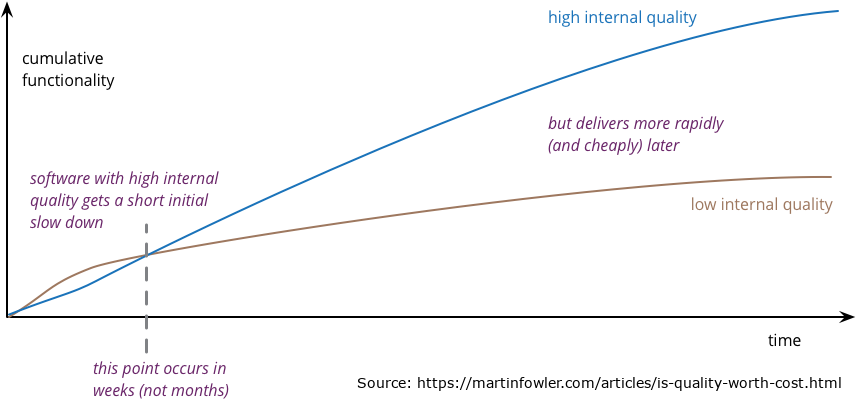Did you ever spend a lot of time cleaning, refactoring, testing and documenting your code, you’re proud of the result, and then… nobody notices? While some developers on your team just hack something together, leave horrible code behind and then get praised for delivering “quickly”.
Frustrating, right? You start to wonder: is clean code even worth the effort?
The answer is: Yes!
Let’s take a look at a few reasons why.
Working in a bad code base sucks
I’m sure every developer remembers at least one of those hours-long debug sessions where it’s mind-numbing just parsing what the heck is even going on, let alone solve the actual problem. Working in a bad code base is frustrating and sucks!
Making changes to a bad code base is slow and on top of that, the frustration has a negative impact on motivation and that impacts the team’s ability to do good work even further.
That was a bit of a no-brainer, so let’s get to the real stuff.
Clean code pays off more quickly than we expect
Most people know that we try to write clean, readable code because bad code comes back to haunt us over the long term, but we underestimate just how quickly that happens.
The question “Is the extra work clean code requires worth the effort?” is part of a more general question: “Is building high quality software worth the effort?”
In 2019, the great Martin Fowler published an article titled: Is High Quality Software Worth the Cost?.
In the chapter “Visualizing the impact of internal quality”, he admits that you can be faster in the short-term with quick, low-quality code, but points out that people underestimate how quickly this becomes a problem. He visualizes it with a nice (pseudo-)graph:

I’ve seen this happen an number of times. When someone says “bad code will slow us down (cost us money) in the future”, people seem to think that we’re talking about some far-away future, like more than a year from now. But it doesn’t take long for low-quality code to start slowing us down. For larger teams, I agree with Martin Fowler, it’s a matter of weeks. For smaller teams, it may take a little longer, but we’re still talking no more than a few months.
The only situations where you can be faster by quickly hacking something together is when all of these apply:
- Short-term results are the only thing that matters
- It’s new code or clean existing code
- Everything fits in your head (making it fit into someone else’s head will be a problem though)
That’s a lot of ifs and there are very few situations where it makes sense to do this. By quickly hacking something together you pretty much always shoot yourself (or the company you work for) in the foot.
Writing clean code doesn’t have to take forever
Writing clean code might seem like a lot of effort at first, but the more you practice it the more clean your code will be from the start, to a point where you’re actually faster writing cleaner code.
If you’re a perfectionist, try to be pragmatic because there are diminishing returns: you could get your code to eg. 80% pretty quickly, but trying to have perfect textbook definition clean code can take a lot of time and is not the goal. You can tweak your code forever and still find some things to change.
Your main goal should be, when a random developer gets dropped into the code to make a change:
- The change can be made in one place without changes in many other places (loose coupling)
- It is clear what the code is doing and where the change should be made without having to carefully read every line to understand what’s going on.
In summary, write clean code because:
- Working in a bad code base sucks
- Bad code will come back to haunt you more quickly than you think
- It doesn’t have to take forever
